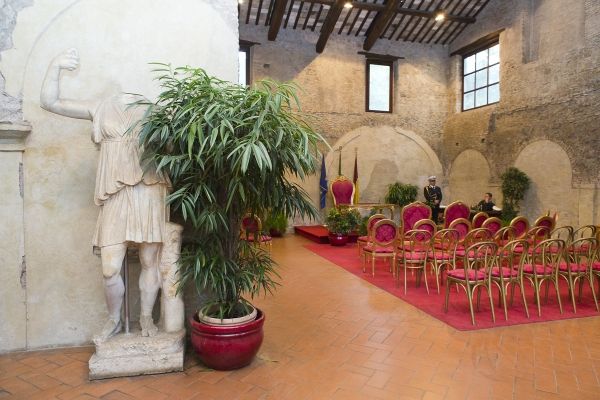A guide to registering civil and religious marriages in Italy.
If you are planning your happy wedding day in Italy you may require a little more time than you thought. So if you would like bells and ribbons instead of red tape, read on.The law on marriages is one and the same all over Italy. However, local town halls may interpret the law in slightly different ways and waive certain requirements. In Italy two forms of marriage are available. Civil marriage, a ceremony carried out by the authorised official at the comune (town hall) or Roman Catholic religious marriages. Couples wanting religious marriage in other denominations need to perform a civil marriage first, as only Catholic priests are authorised marriage officers in Italy.
In order to start your application for a civil marriage you will need the following documents:
A valid passport
Birth certificate – A copy bearing an Apostille stamp in accordance with the Hague Convention on the legalisation of foreign public documents. Apostille stamps are available from the local authority in your country of origin where the certificate was issued. Once this has been obtained the certificate must be translated into Italian.
Evidence of the termination of any previous marriage/s if applicable (e.g. final divorce decree, annulment decree, or death certificate of former spouse, bearing an Apostille stamp and translated into Italian). If you are female and your previous marriage was terminated within the last 300 days, you must obtain a waiver from the Italian district attorney's office (Procura della Repubblica presso il tribunale) at the court in the city where the new marriage will be performed. The waiver is issued upon presentation of medical evidence that you are not pregnant.
Affidavit or nulla osta sworn before a consular officer from your country of origin commissioned in Italy, stating that there is no legal impediment to your marriage according to the laws of your country of origin. You will normally have to schedule an appointment with your consulate. The nulla osta is valid for six months. Once the nulla osta has been issued, it should be taken to the legalisation office (ufficio legalizzazioni) of the local prefettura to legalise it. You will need to purchase a €16 revenue stamp (marca da bollo) from any tobacco shop (tabaccaio) and present it together with the document.
Atto notorio: This is a declaration, in addition to the nulla osta, stating that according to the laws to which you are subject in your country of origin there is no obstacle to your marriage. This declaration is to be sworn before two witnesses (they may be of any nationality but must be over 18 and possess valid photo identification) before an Italian consul outside Italy or, in Italy, before a court official in the city at the notary services office (ufficio atti notori) of the court (tribunale ordinario) having jurisdiction over the city where you intend to marry. Make an appointment in advance. Our advice is to take along your visa or permit of stay (permesso di soggiorno). You will need two revenue stamps of €16 each and one of €10.62 to apply for the atto notorio, which generally will be ready to pick up after four to 10 days.
Declaration of intention to marry: You should present all the above-listed documents to the marriage office (ufficio matrimoni) of the town hall (comune) in the city where the marriage will be performed, and make a declaration of intention to marry (dichiarazione di matrimonio) before a civil registrar (ufficiale di stato civile). If you do not speak Italian, an interpreter should accompany you. For this registration you will usually require a revenue stamp (marca da bollo) to the value of €16 if one of the couple is an Italian citizen, or two marche da bollo if both are non citizens. Civil banns must be posted at the town hall for 11 days. If nobody disputes your request for marriage, after the first eight days of the banns’ being publicly posted the comune will issue another nulla osta and the marriage may be planned. From this date the couple have 180 days in which to perform their marriage.
Civil ceremony: A civil ceremony is performed by the mayor or one of his deputies. Two witnesses and – if necessary – an interpreter must be present at the ceremony. Witnesses may be of any nationality, but must be over 18 and possess valid photo identification. A witness cannot serve as interpreter. At the moment of marriage the couple declare whether or not they want to hold all their assets jointly or individually (comunione legale dei beni or separazione dei beni).
Catholic religious ceremony: for this, you will need the following additional documentation. The Roman Catholic Church requires baptismal and confirmation certificates in addition to the documents listed above. For complete information, you should check with your priest, and it’s worth remembering that Catholic weddings may not be celebrated in the diocese of Rome during Lent. The church will post your marriage banns instead of the comune and issue the nulla osta for the declaration of marriage at your comune. You may be required to attend premarital classes scheduled by the church. The priest will register the marriage with the civil authorities.
Any Italian marriage certificate bearing an Apostille obtained in Italy is internationally recognised. An Apostille is obtainable at the legalisation office of your local prefettura. After obtaining this you may proceed to register your marriage with the consulate of your country of origin if you wish to do so.
Studio Legale Annino www.annino-lawfirm.com
This article first appeared in the May 2014 edition of Wanted in Rome
See related articles on civil unions and celebrancy.
SIDE NOTES
A number of English-speaking Catholic churches perform weddings in Rome.
Pontifical Irish College near the Colosseum has been a popular marriage venue for Irish couples for decades. Ceremonies on Monday, Tuesday, Thursday, Friday. It also arranges weddings at its parish church, S. Giovanni in Laterano. For enquiries weddings@irishcollege.org. Via dei SS. Quattro 1, tel. 06772631. For more information see website.
St Isidore’s College is a Franciscan community located near Piazza Barberini. Weddings are conducted in Irish or English, and minimum advance notice is four months. For enquiries col.isidoro@alice.it. Via degli Artisti 41, tel. 064885359. For details see website.
St Patrick’s American Catholic Parish is the American Catholic church of Rome, located in the Via Veneto area. For enquiries contact rector@stpatricksamericanrome.org. Via Boncompagni 31, tel. 0688818727. For more details see website.
S. Silvestro in Capite is one of the main Catholic churches for the English speaking residents of central Rome. Detailed information on weddings is available on the church's website. Piazza S. Silvestro 1, tel. 066797775.






















